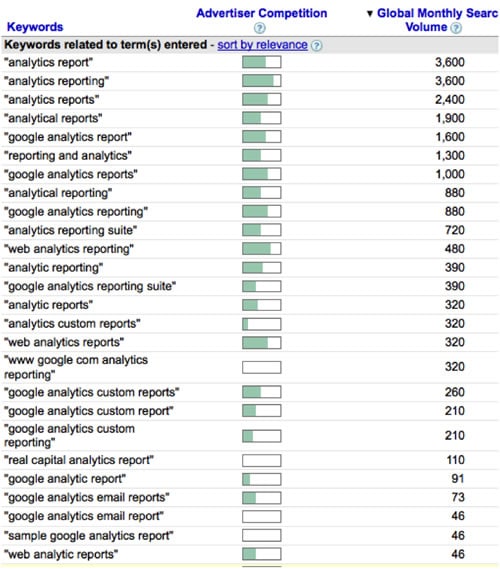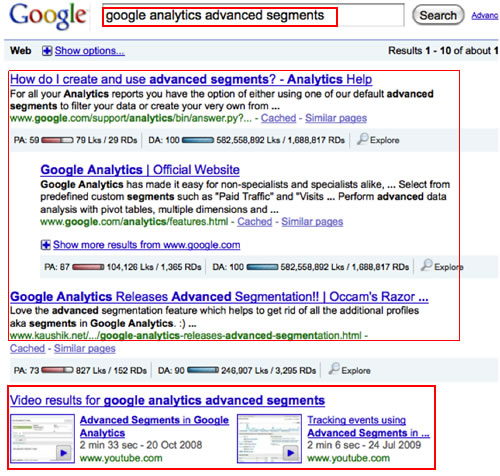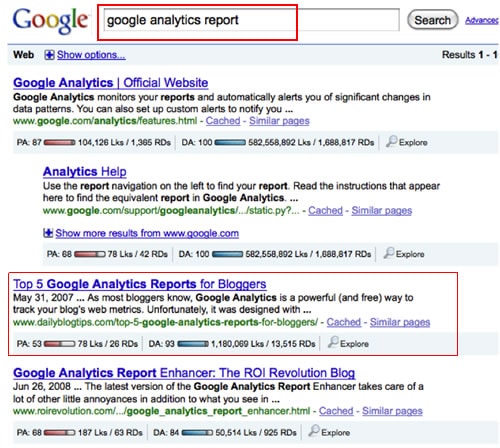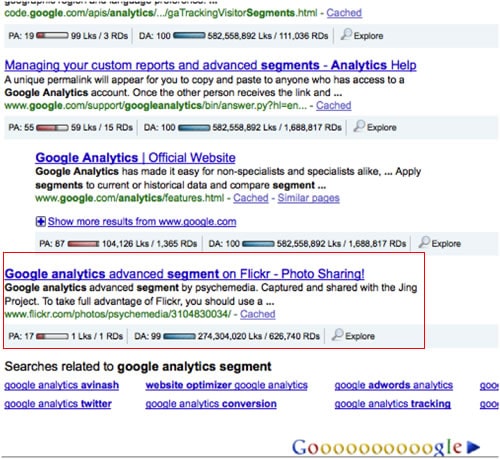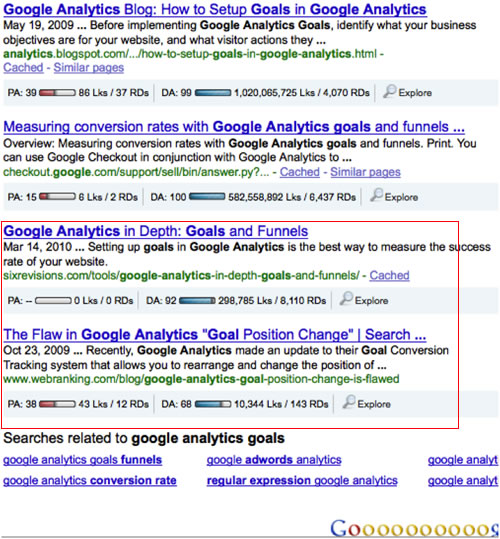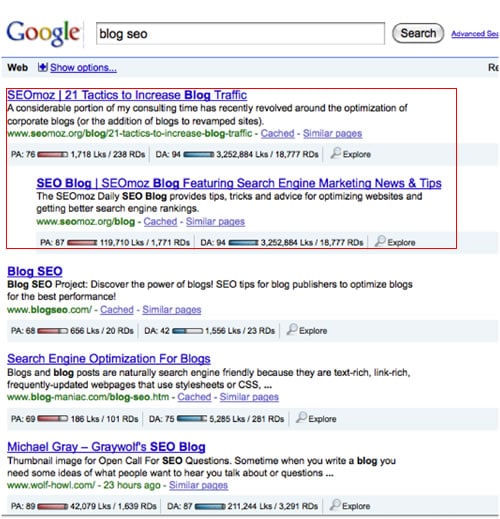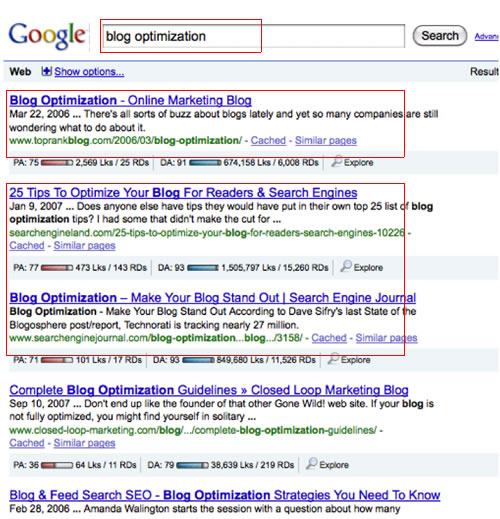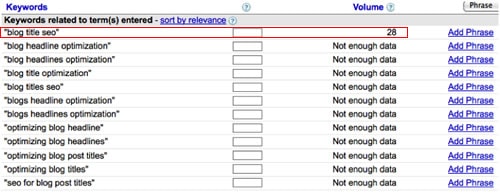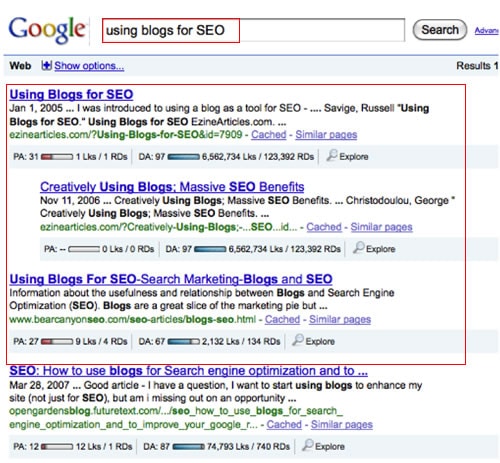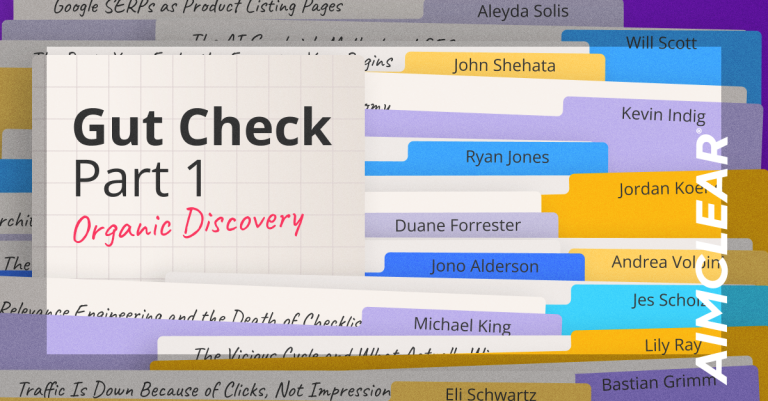Using blogs for SEO is a strategic linchpin of many a marketers’ content tactics. Composing optimized headlines to title posts that are catchy, research driven and relevant to readers, is a classic search engine optimization mission. This post offers two blogging SEO case studies, for constructing posts titles.
Blog post headlines are key on many levels. Most blog CMS (content management system) installations mirror the post headline as the HTML title tag, arguably one of most important SEO ranking factors, for the post detail page. Also when others link your posts, they tend to link out on the post’s title as anchor text. Therefore depending on the competitiveness of the topic space in the organic SERPs (search engine results pages), the first couple of words in the upper left of the post title are usually the main semantic weapons for the post.
Post Title
Title Tag in WordPress
Right at the beginning it’s a good idea to articulate a concept for a blog post in a longer sentence, so the idea is expressed fully without the pressure of having to build compact optimized titles whilst in first creative steps. I don’t want to be held back. The most important consideration is that this first working title truly be what the post is about, without compromise.
Let’s say the post is about “How a Single Google Analytics Custom Segment Can Revolutionize Your Reports.” We start by identifying organic targets. Start by running various combinations of the most important words through a keyword research tool at phrase match or equivalent.
For this post, let’s test:
- analytics report
- analytics reporting
- analytics reports
- google analytics report
- google analytics reporting
- google analytics reports
The reason to test both short tail (“analytics”) and longer tail (“google analytics”) is because we want to know roughly what percentage of the analytic reporting space is specifically about Google analytics reports.
“Google Analytics-[technical-anything]” is difficult keyword space to crack at the top, with the likes of Google and Avinash dominating. Specific technical terms are highly contested on the long tail.
We’ll need to be clever and discerning in our keyword research to ultimately land a page one unpersonalized ranking for our headline and post. Like any competitive SEO mission, start by finding keywords with which it’s realistic to debut on page one or two. Remember that link building (internal and external), buzz and longevity will do the trick to raise the listing some with enough work to support great content. Keep poking around and look further down toward the bottom of SERPs to see what’s attainable. The singular permutation of “google analytics report” is interesting KW territory because it’s not technical enough for Google to have targeted as heavily.
Measure the unpersonalized SERPs. It’s a good idea to look at how competitive SERPs are for the keywords under consideration. We use Majestic SEO’s tool and SEMmoz’s Linkscape for quick looks at SERPs competitiveness.
Yep, for a publication of decent authority like AIMCLEAR Blog, “google analytics report” is doable to rank at (unpersonalized) #3 or #4 with a little work after-the-act. This KW also may also portend users who don’t fully understand how GoogleAnalytics work. They’re not searching the most technical of terms. Hmmm. Maybe the goal should be to hook these slightly less tech-savvy analytics seekers who want to grow. Perhaps they will become fans of AIMCLEAR Blog as they learn. Targeting this crowd makes sense because we’re consultants in the web analytics space, and ostensibly blogging to make friends and customers.
Now make sure we’re not missing highly specific keywords that might also be searched for with any frequency.
So let’s test:
- google analytic segment
- google analytic segments
- google analytics segment
- google analytics segments
- google analytic custom segment
- google analytic custom segments
- google analytics custom segment
- google analytics custom segments
- google analytic advanced segment
- google analytic advanced segments
- google analytics advanced segment
- google analytics advanced segments
The words “segment” and “segments,” in combination with “Google Analytics” seem attainable. By the way, Advertiser Competition in Google’s External Keyword Tool speak to PPC advertisers. Sometimes this metric can suggests easier organic space as well.

You know the drill. Check SERPs competitiveness. Here’s the singular expression:
(bottom of SERPs)
The word “goals” also showed up in our research.
“Google analytics goals” is not highly competitive but users search for it a fair amount.
Great! The singular keyword “segment” and plural “goals” have only light competition at the bottom of page one. Now we know there’s some attainable SEO real estate available. Our research has provided insight to the blog title SEO process and we’ve found mid and long-tail phrase match keyword inventory.
Putting It All Together
As you recall, the initial post idea was “How a Single Google Analytics Custom Segment Can Revolutionize Your Reports.” Using the data gleaned by keyword research, let’s make some changes. The first headline idea was, “How a Single Google Analytics Custom Segment Can Revolutionize Your Reports.”
First, it’s not a “custom” segment I’m going to write about. The correct term is “advanced” segment. “Custom” refers to reports in GA. Start changing the headline.
“How a Single Google Analytics Custom Segment Advanced Segment Can Revolutionize Your Reports.”
Now we’ll modify the post title based on the organic targets identified in our research. We’re going to mash up “google analytics report,” “segment” and “goals.”
The word “advanced” is cool, but we’ve already ascertained that Google dominates this more technical permutation. We’ll leave it out of the title, and save it for the body of the post, no doubt to rank for long tail 4-5 word phrases that include “advanced. The word “your” is not necessary and we’re striking “reports” because of the usage of the singular “report” earlier in the headline.
“How a Single Google Analytics Report Advanced Segment Can Revolutionize Your Reports.”
Add the word “goals” and we’re done!
“How A Single Google Analytics Report Segment Can Revolutionize Goals”
—————————————————————————————————-
BTW: For this blog post you are currently reading, we tested:
- blog seo
- blogs seo
- blog headline optimization
- blog headlines optimization
- blogs headline optimization
- blogs headlines optimization
- optimizing blog headline
- optimizing blog headlines
- optimizing blog
- optimizing blogs
- seo for blogs
- seo for blog
- blog search engine optimization
- blogs search engine optimization
- blog optimization
- blogs optimization
- blog title seo
- blog titles seo
- optimizing blog titles
- blog title optimization
- optimizing blog post titles
- seo for blog post titles
Sure, this is hard keyword space to get into at the top, with the likes of SEOmoz dominating.
Our friend Lee Odden claimed the short tail “blog optimization” space a long time ago. SearchEngineLand and SearchEngine Journal are also in the space.
Once again, begin by identifying a SERP where it’s realistic to debut on page one. Bear in mind that internal and external link building, buzz and other SEO ranking factors will grow this page if the content is awesome and y’all work hard. Look further down the SERP to see what’s attainable. The bottom of page one seems attainable for “blog optimization.”
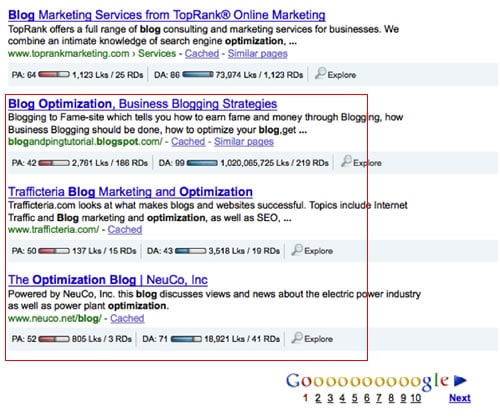
There’s little statistically relevant keyword inventory for the “headline” and “title” space as pertains to blog optimization. Still, we’re not afraid to head out on the long tail. The readers we’ll gain by long tail SEO are few but highly focused.
Finally, let’s identify another long tail keyword target that is most likely attainable just by using the keywords on the page, let alone the blog title. [This debuted on page one for blog title seo.]
In this case “using blogs for SEO” seems to be a reasonable SEO target.



